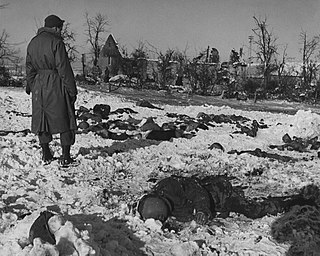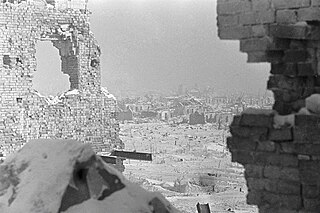
The Nuremberg trials were held by the Allies against representatives of the defeated Nazi Germany for plotting and carrying out invasions of other countries across Europe and atrocities against their citizens in World War II.

The Treaty of Versailles was a peace treaty signed on 28 June 1919. As the most important treaty of World War I, it ended the state of war between Germany and most of the Allied Powers. It was signed in the Palace of Versailles, exactly five years after the assassination of Archduke Franz Ferdinand, which led to the war. The other Central Powers on the German side signed separate treaties. Although the armistice of 11 November 1918 ended the actual fighting, and agreed certain principles and conditions including the payment of reparations, it took six months of Allied negotiations at the Paris Peace Conference to conclude the peace treaty. Germany was not allowed to participate in the negotiations before signing the treaty.

A war crime is a violation of the laws of war that gives rise to individual criminal responsibility for actions by combatants in action, such as intentionally killing civilians or intentionally killing prisoners of war, torture, taking hostages, unnecessarily destroying civilian property, deception by perfidy, wartime sexual violence, pillaging, and for any individual that is part of the command structure who orders any attempt to committing mass killings including genocide or ethnic cleansing, the granting of no quarter despite surrender, the conscription of children in the military and flouting the legal distinctions of proportionality and military necessity.

Crimes against humanity are certain serious crimes committed as part of a large-scale attack against civilians. Unlike war crimes, crimes against humanity can be committed during both peace and war and against a state's own nationals as well as foreign nationals. Together with war crimes, genocide, and the crime of aggression, crimes against humanity are one of the core crimes of international criminal law and, like other crimes against international law, have no temporal or jurisdictional limitations on prosecution.

The Paris Peace Conference was a set of formal and informal diplomatic meetings in 1919 and 1920 after the end of World War I, in which the victorious Allies set the peace terms for the defeated Central Powers. Dominated by the leaders of Britain, France, the United States and Italy, the conference resulted in five treaties that rearranged the maps of Europe and parts of Asia, Africa and the Pacific Islands, and also imposed financial penalties. Germany, Austria-Hungary, Turkey and the other losing nations were not given a voice in the deliberations; this later gave rise to political resentments that lasted for decades. The arrangements made by this conference are considered one of the great watersheds of 20th-century geopolitical history.

The International Military Tribunal for the Far East (IMTFE), also known as the Tokyo Trial and the Tokyo War Crimes Tribunal, was a military trial convened on 29 April 1946 to try leaders of the Empire of Japan for their crimes against peace, conventional war crimes, and crimes against humanity, leading up to and during the Second World War. The IMTFE was modeled after the International Military Tribunal (IMT) at Nuremberg, Germany, which prosecuted the leaders of Nazi Germany for their war crimes, crimes against peace, and crimes against humanity.

A war of aggression, sometimes also war of conquest, is a military conflict waged without the justification of self-defense, usually for territorial gain and subjugation, in contrast with the concept of a just war.

Article 231, often known as the "War Guilt" clause, was the opening article of the reparations section of the Treaty of Versailles, which ended the First World War between the German Empire and the Allied and Associated Powers. The article did not use the word guilt but it served as a legal basis under which Germany was to pay reparations for damages caused during the war.

Theodor Meron, is an American lawyer and judge. He served as a judge of the International Criminal Tribunal for the former Yugoslavia (ICTY), International Criminal Tribunal for Rwanda (ICTR), and the International Residual Mechanism for Criminal Tribunals (Mechanism). He served as President of the ICTY four times and inaugural President of the Mechanism for three terms (2012–19).

A crime of aggression or crime against peace is the planning, initiation, or execution of a large-scale and serious act of aggression using state military force. The definition and scope of the crime is controversial. The Rome Statute contains an exhaustive list of acts of aggression that can give rise to individual criminal responsibility, which include invasion, military occupation, annexation by the use of force, bombardment, and military blockade of ports. In general, committing an act of aggression is a leadership crime that can only be committed by those with the power to shape a state's policy of aggression, as opposed to those who discharge it.

The Istanbul trials of 1919–1920 were courts-martial of the Ottoman Empire that occurred soon after the Armistice of Mudros, in the aftermath of World War I.
After World War I, the effort to prosecute Ottoman war criminals was taken up by the Paris Peace Conference (1919) and ultimately included in the Treaty of Sèvres (1920) with the Ottoman Empire. The Ottoman government organized a series of courts martial in 1919–1920 to prosecute war criminals, but these failed on account of political pressure. The main effort by the Allied administration that occupied Constantinople fell short of establishing an international tribunal in Malta to try the so-called Malta exiles, Ottoman war criminals held as POWs by the British forces in Malta. In the end, no tribunals were held in Malta.
Impunity is the ability to act with exemption from punishments, losses, or other negative consequences. In the international law of human rights, impunity is failure to bring perpetrators of human rights violations to justice and, as such, itself constitutes a denial of the victims' right to justice and redress. Impunity is especially common in countries which lack the tradition of rule of law, or suffer from pervasive corruption, or contain entrenched systems of patronage, or where the judiciary is weak or members of the security forces are protected by special jurisdictions or immunities. Impunity is sometimes considered a form of denialism of historical crimes.
A war crimes trial is the trial of persons charged with criminal violation of the laws and customs of war and related principles of international law committed during armed conflict.

The Leipzig war crimes trials were held in 1921 to try alleged German war criminals of the First World War before the German Reichsgericht in Leipzig, as part of the penalties imposed on the German government under the Treaty of Versailles. Twelve people were tried, and the proceedings were widely regarded at the time as a failure. In the longer term, they were seen by some as a significant step toward the introduction of a comprehensive system for the prosecution of international law violations.

Mineichirō Adachi was a Japanese legal expert and President of the Permanent Court of International Justice at the Hague from 1931 until 1934.

Harukazu Nagaoka was a Japanese diplomat and jurist who served as member of the Japanese delegation to the Commission of Responsibilities at the Paris Peace Conference and represented Japan to the League of Nations. He also sat on a number of national and international judicial and arbitral positions, including as a judge on the Permanent Court of International Justice.

United Nations Security Council resolution 955, adopted on 8 November 1994, after recalling all resolutions on Rwanda, the Council noted that serious violations of international humanitarian law had taken place in the country and, acting under Chapter VII of the United Nations Charter, established the International Criminal Tribunal for Rwanda (ICTR).

The Štip massacre was the mass murder of Serbian soldiers by paramilitary forces of the Internal Macedonian Revolutionary Organization (IMRO) in the village of Ljuboten, Štip on 15 October 1915, during World War I. Sick and wounded Serbian soldiers, recuperating at the Štip town hospital, were detained by Macedonian IMRO militants before being taken into the vicinity of Ljuboten and killed. An estimated 118–120 Serbian soldiers were executed in the massacre.

The Bulgarian occupation of Serbia during World War I started in Autumn 1915 following the invasion of Serbia by the combined armies of Germany, Austria-Hungary and Bulgaria. After Serbia's defeat and the retreat of its forces across Albania, the country was divided into Bulgarian and Austro-Hungarian occupation zones.
















